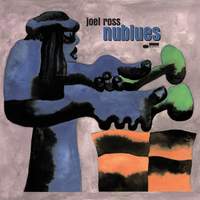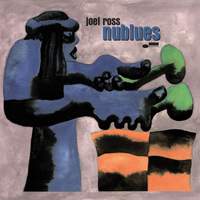Recording of the Week,
Joel Ross - nublues

This year, Blue Note Records celebrates its 85th birthday - but, as we all know, what comes out of the studio is only the half of it. Currently touring North America is the Blue Note Quintet, an all-star band put together in celebration of the label’s milestone anniversary. A key member of that ensemble is vibraphonist Joel Ross, one of the most prominent figures of the current Blue Note brigade. Certainly, in recent years, he has become the instrument’s chief proponent on the international stage; a position that comfortably renders him as the latest entry into the lineage of established legacy performers including Milt Jackson and Bobby Hutcherson.
As a musician, Ross hails from the school of enlightened experimentalism, always looking to expand his instrument’s language and sharpen its vocabulary. During the pandemic, he remained in New York with the family of his partner, flautist Gabrielle Garo. Following the wisdom of his cohabitee, Ross elected not to waste his new-found free time, but to enrol at New York’s pioneering academy for performing arts and contemporary music, The New School. The vibraphonist reentered the artist-centric establishment with a mindset that was ripe for education, and it was during his time there that he would reevaluate the impetus for his own music-making.
Before his very eyes, Ross witnessed musical fundamentals being broken down as part of his improv class under saxophonist Darius Jones. Focusing on the blues, the teacher encouraged his students to go back to basics. In a critical exercise that would force Ross to explore beyond the notion of 12-bar progressions and to reckon with the concept's history and interpretations, it also revealed a definition for the term of his own deciphering. Through reading books by Amiri Baraka and Val Wilmer, this tuition led him to uncovering the origins of the blues, its journey and ultimate destination – and where he himself might fit into its grand narrative.

nublues is Ross’ first album since 2022’s The Parable of the Poet. By that point in his career, Ross had already spoken of evolving beyond jazz’s conventional structures and arriving at a place whereby content surreptitiously dictates form. In order to delineate the vast, uncharted boundaries of the blues, Ross employs an attitude of what he calls “a constant continuing”, whether that means revisiting the spiritual foundations of his own Baptist upbringing or receiving inspiration from the greats. In fact, on a track like ‘bach (God the Father in Eternity)’, he did both, taking inspiration from a harmony assignment which pitted J.S. Bach alongside Thelonious Monk in a move that found him “learn[ing] from his learning.” As a leader, Ross prefers not to instruct his bandmates too explicitly, but to let the music decide where it wants to go. Just because the music exists without direction, however, that’s not to say it’s entirely directionless. The tune’s hymnal authenticity is a deeply embedded example of musicians leading with heart before head, united by their mutual passion for and faith in the process.
The record’s carefully mapped-out sequence is an unruffled joy; Monk’s ‘Evidence’ insightfully cuts rank with two Coltrane tunes (‘Equinox’ and ‘Central Park West’), each of which flow languorously with the incessant pull of a lazy river. Navigated by Ross’ glassy chimes, elements of both blues and ballads are incorporated along the way, supplemented by the spiralling soul-cries of saxophonist (and fellow Blue Note all-star) Immanuel Wilkins. Ross' latest work polishes away the heady experiences of the vibraphonist's rapidly-accelerating career, leaving behind a boldly refined statement in its sheen.
Joel Ross plays the Vortex Jazz Club in London on April 11th.




